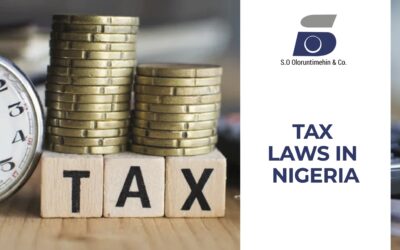Legal News & Resources
Tax Laws in Nigeria
According to the Legal Information Institute, tax is any charge of money or property that is imposed by a government upon individuals or entities that are within the government's authority to collect. This charge or levy is typically imposed on taxpayers in order to...
Laws and Regulations Guiding the Operation of the Telecommunications Industry
In this article, we shall be examining the legislative framework available in the telecommunications industry in Nigeria. The Nigerian Communications Commission Act No. 19 of July, 2003 (2003 Act) is the primary legislation regulating the telecommunications industry...
Key Highlights of the Petroleum Industry Act 2021
The Petroleum Industry Act (Act) was finally signed into law on the 16th of August 2021 by President Muhammadu Buhari, the President of the Federal Republic of Nigeria. The passage of the Act after almost 20 years in the making is a significant milestone for the...
Competition and Consumer Protection in Nigeria
In 2018, the National Assembly enacted the Federal Competition and Consumer Protection Act 2018. The Act seeks to, amongst several others, promote and maintain competitive markets in the Nigerian economy, protect and promote the interests and welfare of consumers,...
Registration and Monitoring of Technology Transfer Agreements in Nigeria
The National Office for Technology Acquisition and Promotion (NOTAP) is a parastatal under the supervision of the Federal Ministry of Science and Technology. It was established by the NOTAP Act, Cap. N62 LFN 2004 to regulate the inflow of foreign technology into the...
Joint Venture Property Development in Nigeria
In the recent years, the housing deficit in Nigeria was estimated to be around 17 Million. It was also projected that Nigeria will require about 59 Trillion naira to remedy this situation. The imperative to build more houses is now driving increased property...
Exporting Agricultural Produce from Nigeria
With a population of more than 200 million and land mass of 923,768 km2, Nigeria is well positioned to be one of the largest exporters of agricultural produce. Ironically, this is not yet the case as Nigeria significantly relies on the importation of agricultural...
Foreign Investment in Nigeria
The history of foreign participation in Nigeria can be traced back to 1972 when the Nigerian Enterprises Promotion Decree (NEPD) was enacted. This law provided that certain enterprises were exclusively reserved for Nigerians while others had to have at least 40%...
Nigerian YouTube Creators to Pay Taxes to the US YouTube to deduct taxes from non-US creators
YouTube, the Google-owned company, has released a statement requiring all creators in the YouTube Partner Program (YPP) to submit their tax information to Google. Google stated that it has a responsibility under Chapter 3 of the United States (US) Internal Revenue...









